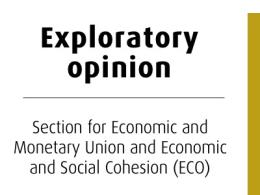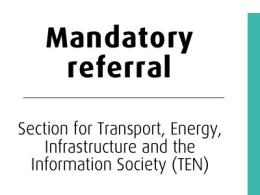European Economic
and Social Committee
Main navigation
-
O nas
ABOUT
The European Economic and Social Committee (EESC) is the voice of organised civil society in Europe.
Find out more about its role and structure at http://www.eesc.europa.eu/en/about
- Politična struktura
- Upravna struktura
- SODELOVANJE Z DRUGIMI INSTITUCIJAMI
- Rules
-
Naše delo
OUR WORK
The EESC issues between 160 and 190 opinions and information reports a year.
It also organises several annual initiatives and events with a focus on civil society and citizens’ participation such as the Civil Society Prize, the Civil Society Days, the Your Europe, Your Say youth plenary and the ECI Day.
Find the latest EESC opinions and publications at http://www.eesc.europa.eu/en/our-work/opinions-information-reports/opinions and http://www.eesc.europa.eu/en/our-work/publications-other-work/publications respectively.
- Mnenja in informativna poročila
- Dokumenti
- Publikacije in drugo delo
-
Udeležba civilne družbe in državljanov
- Civil Society Week
- European elections 2024
- Nagrada za civilno družbo
- The Conference on the Future of Europe
- Evropski potni list za demokracijo
- Vaša Evropa, vaš glas
- Evropska državljanska pobuda
- The path to our industrial future
- Youth Climate and Sustainability Round Tables
- EU Organic Awards
- Civil Society Against COVID 19
- EESC stands with Ukraine
- Partnerships
- Relations with ESCs
-
Politike
POLICIES
The EESC is active in a wide range of areas, from social affairs to economy, energy and sustainability.
Learn more about our policy areas and policy highlights at http://www.eesc.europa.eu/en/policies
-
Politična področja
- Kmetijstvo, razvoj podeželja in ribištvo
- Podnebne spremembe
- Kohezijska, regionalna in mestna politika
- Potrošniki
- Digitalne spremembe in informacijska družba
- Ekonomska in monetarna unija
- Izobraževanje in usposabljanje
- Zaposlovanje
- Energetika
- Podjetništvo
- Okolje
- Zunanji odnosi
- Finančne storitve in kapitalski trgi
- Temeljne pravice in pravice državljanov
- Housing
- Industrija in industrijske spremembe
- Institucionalne zadeve in proračun EU
- Migracije in azil
- Raziskave in inovacije
- Storitve splošnega pomena
- Enotni trg
- Socialne zadeve
- Trajnostni razvoj
- Obdavčitev
- Promet
-
Politična področja
-
Program dogodkov
AGENDA
The EESC holds nine plenary sessions per year. It also organises many conferences, public hearings and high-level debates related to its work.
Find out more about our upcoming events at http://www.eesc.europa.eu/en/agenda/our-events/upcoming-events
- Naši dogodki
-
Novice in mediji
NEWS & MEDIA
Here you can find news and information about the EESC'swork, including its social media accounts, the EESC Info newsletter, photo galleries and videos.
Read the latest EESC news http://www.eesc.europa.eu/en/news-media/news and press releases http://www.eesc.europa.eu/en/news-media/press-releases
- President
-
Člani in skupine
MEMBERS & GROUPS
The EESC brings together representatives from all areas of organised civil society, who give their independent advice on EU policies and legislation. The EESC's326 Members are organised into three groups: Employers, Workers and Various Interests.
Find out more about our Members and groups at http://www.eesc.europa.eu/en/members-groups
- Člani
- Skupine
-
Strokovne skupine in drugi organi
SECTIONS & OTHER BODIES
The EESC has six sections, specialising in concrete topics of relevance to the citizens of the European Union, ranging from social to economic affairs, energy, environment, external relations or the internal market.
Find out more at http://www.eesc.europa.eu/en/sections-other-bodies
-
Strokovne skupine / komisija
- Ekonomska in monetarna unija ter ekonomska in socialna kohezija (ECO)
- Enotni trg, proizvodnja in potrošnja (INT)
- Promet, energija, infrastruktura in informacijska družba (TEN)
- Employment, Social Affairs and Citizenship (SOC)
- Kmetijstvo, razvoj podeželja in okolje (NAT)
- Zunanji odnosi (REX)
- Posvetovalna komisija za spremembe v industriji (CCMI)
- Opazovalne skupine
- Drugo
-
Strokovne skupine / komisija
- Ukraine




